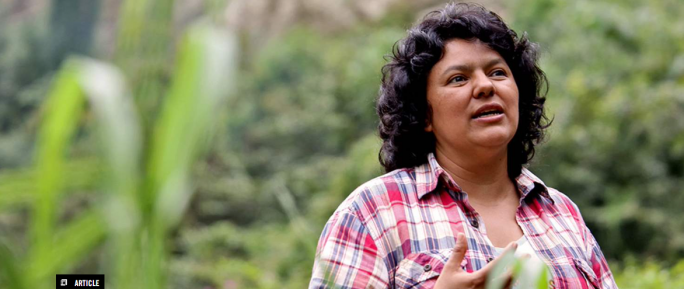Honduras must do more to bring to justice the people responsible for or complicit in the murder of Indigenous rights defender Berta Cáceres, Amnesty International says.
Amnesty International calls on the Honduran state to ensure that truth and independent and impartial justice for her family and loved ones is guaranteed without delay. “Eight years after the murder of Berta Cáceres, her family continues to face an incomplete judicial process that unnecessarily perpetuates their anguish. It is imperative that the Honduran authorities take decisive action to end the cycle of impunity in this case,” said Astrid Valencia, Americas deputy director for research at Amnesty International.
- Related: Activists face harassment and killings in campaign to protect rivers in Honduras
- Take action: Support defenders of justice under attack in Central America
Berta’s family and the Civic Council of Popular and Indigenous Organizations of Honduras (COPINH) continue to demand that the Honduran authorities hold all those involved in the crime to account, including those who planned and ordered the murder of Berta Cáceres.
Honduran rights defender Berta Cáceres killed on 2 March 2026
On 2 March 2016, environmental and indigenous rights defender Berta Cáceres was shot dead by armed men at her home in Intibucá, Honduras. She was the coordinator of the Civic Council of Popular and Indigenous Organizations of Honduras (COPINH) and was campaigning against the Agua Zarca hydroelectric dam project and its impact on the territory of the Lenca Indigenous people.
On 20 June 2022, the Tegucigalpa Sentencing Court with National Territorial Jurisdiction in Criminal Matters sentenced David Castillo, former manager of the company Desarrollos Energéticos (DESA) and responsible for the Agua Zarca hydroelectric project, to 22 years and 6 months in prison. He had been arrested in March 2018 and convicted in July 2021 as co-perpetrator of the murder of human rights defender Berta Cáceres in 2016, following a trial that began in April 2021.
Previously, on 29 November 2018, a Sentencing Court found seven of eight other defendants guilty of the murder of Berta Cáceres. More than a year later, on 2 December, all seven were sentenced to between 30 and 50 years in prison.
Human rights defenders in Honduras continue to be attacked with impunity. Murder is the greatest risk faced by environmental defenders in the country, which has the highest per capita murder rate in the world, according to Global Witness. Amnesty International has also documented threats and disappearances of environmental defenders in Honduras.
Despite the seriousness of the attacks on environmental defenders, Honduras has not signed the Escazú Agreement, the first environmental human rights treaty in Latin America and the Caribbean, which commits signatory states to protect environmental defenders. This agreement entered into force on 22 April 2021.
Header photo credit: Goldman Environmental Prize





















